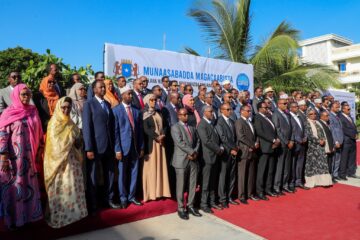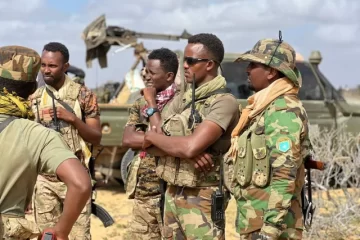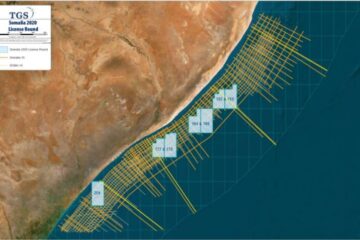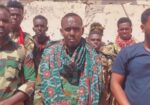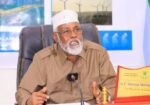Five key factors that propelled President Mohamud to election victory

Former President Farmajo, left, hands the Somali flag to newly elected President Mohamud during a handover ceremony at the presidential palace
Elected on May 15, Mohamud became the first Somali president to win a second term
Somalia’s presidential election saga came to an end on May 15 after Hassan Sheikh Mohamud was elected president following an intense contest with then the incumbent Mohamed Abdullahi Mohamed, better known as Farmajo. The two made it to the final round which saw Mohamud garnering 214 votes to his competitor’s 110 in a marathon poll that saw 36 candidates running for the country’s top post.
Farmajo was quick to concede defeat and officially handed over power to his immediate predecessor on May 23 making him the latest Somali head of state in the past 22 years to uphold the culture of peaceful transfer of power. Hence, Mohamud, who was Somalia’s president between 2012 and 2017, became the first Somali president to win a second term.
This piece looks at the five main factors that have proved crucial in propelling President Mohamud to victory.
First, President Mohamud was among the five main contenders battling it out for presidency. The other four were Farmajo, former Prime Minister Hassan Ali Khaire, former president Sharif Sheikh Ahmed, and Puntland state president Said Abdullahi Deni. All of them but Sharif made it to the second round. Deni topped the first round with 65 votes, followed by Farmajo with 59 votes, while Mohamud and Khaire garnered 52 and 47 votes respectively. Being a former president, Mohamud was able to tap into his experience as a former president to showcase himself as the only leader capable of steering Somalia towards political stability, good governance and consensus democracy.
Second, President Mohamud had established a strong team of senior and influential politicians around him who are also known to be very loyal to him. These politicians have been credited for laboriously lobbying for Mohamud’s election. Hailing from diverse clans, federal member states, and political ideologies, these politicians have proved to be a strong asset at the president’s disposal during the campaign. Mohamud’s strong belief in federalism and his call for ‘saving’ it aided his rise as a key candidate in the presidential race. The party Mohamud leads, the Union for Peace and Development Party (UPD), is one of the most organized and diverse in the country. His pick for the post of prime ministry, Hamza Abdi Barre, is a member of the political party and has four six years (2011-2017) served as the secretary-general of the Peace and Development Party, the precursor to UDP.
Third, Mohamud successfully managed to recruit into his camp some of Farmajo’s close allies and campaigners. He forged strong alliances with various camps in Somalia’s political landscape including influential figures hailing from Somaliland who were previously allies of Farmajo and whose votes have proved crucial in Mohamud’s election victory.
The fourth factor is the president’s effective campaign management team that was able to mobilize resources necessary for a highly organized campaign. These campaigns gained further momentum in the election hall as Mohamud proceeded to the next rounds and the race for the presidency became tighter. In addition, the president’s media campaign was active promoting his popular slogan that promised to make Somalia at peace with itself and at peace with the world. The president also promised during his campaign to be a leader for all symbolized by his driving of a long train large enough to accommodate everyone. Moreover, his party office has been vibrant with frequent events to interact with the citizens alongside other campaign events in various hotels.
The fifth determinant relates to his skillful lobbying to convince other competitors who garnered substantial albeit insufficient number of votes in the polls to back him as their plan B in subsequent rounds. Noticing their chances for presidency fade away, these prominent presidential candidates asked their voters to back Mohamud over other chief contenders. This in part explains why the president secured 214 votes out of 329 in the final round of the election.
Despite the optimism accompanying Mohamud’s election, the president inherits several challenges from his predecessor, including a polarized country, the threat of al-Shabaab extremist group, and a devastating drought that threatens the lives of millions of Somalis. Inflation in the country has also skyrocketed and food and fuel prices continue to soar as a result of the Ukraine conflict. Meanwhile, tensions in the region such the Nile Dam dispute between Ethiopia and Egypt are set to test Mohamud’s diplomatic prowess and his “Somalia at peace with itself, and at peace with the world” motto.

